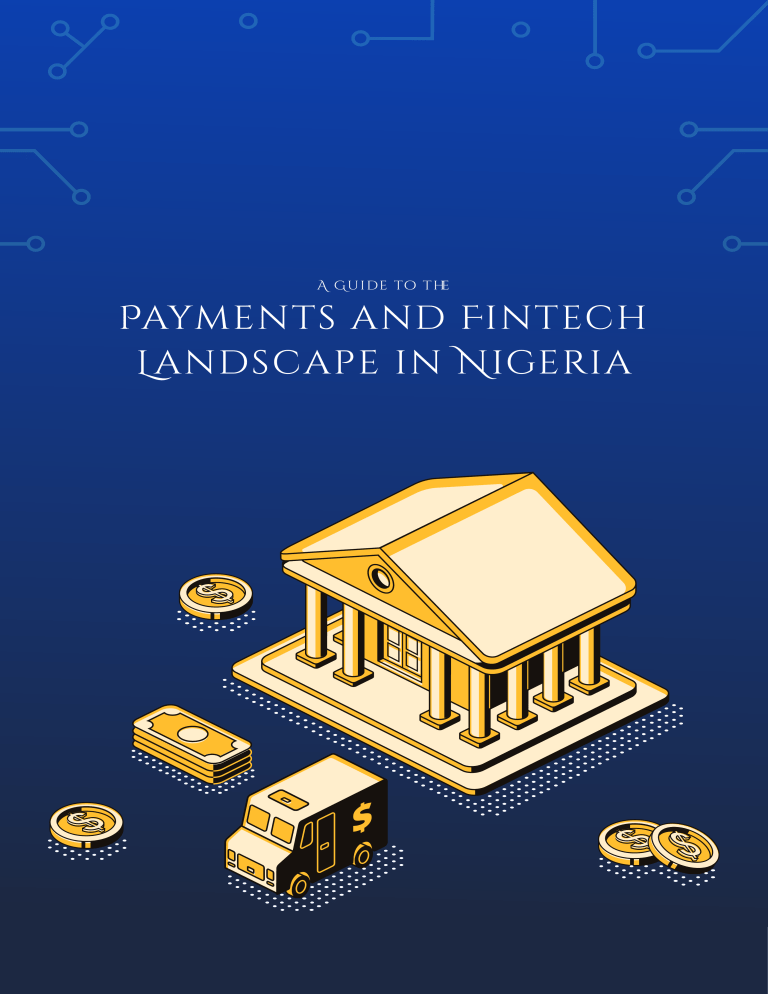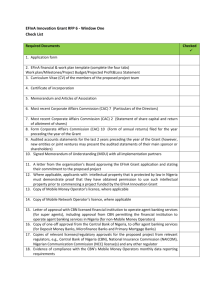
A Gui de to t he Payments and Fintech Landscape in Nigeria INTRODUCTION i Introduction The year 2018 has been an interesting one for FinTech startups in Africa. From major funding announcements to ground breaking events to new policy directions, the space has clearly been a busy one. A quick search made me realize that most of the information out there is largely fragmented and difficult to understand. I couldn’t find a single source that gives a clear picture of activities within the space. Across the continent, over $560million was invested in tech companies in 2017. Of the $114million reportedly raised by tech companies in Nigeria, 75% of it went to FinTechs. This ebook is my attempt to give a basic overview and breakdown of the different areas within the electronic payment and FinTech ecosystem in Nigeria. It also includes a list of some active players in the different categories. I have similarly tried to highlight the different regulatory licenses required to operate at different levels, especially in the light of the new PSP (Payment Service Provider) and PSB (Payment Service Bank) guidelines recently released by the Central Bank of Nigeria. So far in 2018, Nigeria FinTechs have raised over $95million according to publicly available data. If you have been following the startup ecosystem in Nigeria, you are probably inundated with news about FinTechs and their activities on a daily basis. This media attention can be largely attributed to these major investments. Considering the quality of companies and founders in the space, and the opportunity to build a massive company with both social and economic return potential, I believe this attention and investments are rightly deserved. With this background and the preponderance of payments and FinTech startups springing up daily, one would have thought that most of the basic information required to make sense of the space will be readily available on the first page of a Google search. I recently discovered that’s not the case when I had a discussion with a key ecosystem player who expressed his frustrations in accessing clear information on FinTech related activities and licenses in Nigeria. A few weeks before then, a former boss and mentor had also called to discuss a similar topic. I remember I’ve had friends, budding FinTech entrepreneurs, bankers, corporate executives, investors and other stakeholders ask one or two questions in trying to understand the electronic payment and FinTech landscape. The overview and categorizations in the subsequent pages are strictly informational and by no means exhaustive. Do not act on the information herein without thorough examination of the particular situation. Reading this e-book will not make you a FinTech expert or “thought-leader” overnight :). I hope this gives you enough context and clarity to better understand the space. Have a great read and happy FinTeching. Segun Adeyemi PAYMENTS & RELATED CATEGORIES Ecosystem Players & Stakeholders PAYMENTS & RELATED CATEGORIES 1 Payment Solution Service Providers (PSSP) These are companies that have been licensed by the Central Bank of Nigeria (CBN) to provide the underlying infrastructure, end-to-end electronic payment solutions, systems and services to stakeholders within the financial services space. Until the newly proposed tiered payment system providers (PSP) licensing structure, the PSSP along-side the Switching license has been the goto license for players in the fintech space because it gives the most flexibility in terms of scope of what can be done. PSSP provides the underlying infrastructure, end-to-end electronic payment solutions The companies that operate here typically have direct integration into the card schemes (Visa, Mastercard & Verve) and a deeper relationship with banks and some have systems integrated directly into the core banking systems. A recent report claimed that only 7 companies have been granted this license in Nigeria. Obviously, companies such as Interswitch hold PSSP license. Payment Gateways Providers They are mostly facilitators between the merchant’s customers and the actual payment processors These are mostly facilitators between the merchant’s customers and the actual payment processors, these companies can also be referred to as merchant aggregators. In some cases, these companies are also the payment processors or they connect to the different payment processors to process web/mobile transactions on behalf of merchants. This is the most active space as both the payment processors themselves, banks and other payment startups who offer additional value-added services to merchants, play in this space. Our payment gateway product Amplifypay falls under this category. For this category, before the recently proposed PSP licensing structure, there was no clear regulatory requirement and most players in this category are essentially required to meet certain security measures that enables them to collect and transmit card details to the end processors. The global security standard from a compliance standpoint is the Payment Card Industry Data Security Standard (PCI DSS) that a provider’s systems need to be certified for regularly, to operate at this level. All the payment companies that acquire merchants fall under this category, either they process themselves or transit to an end processor. Some players here include Webpay (By Interswitch); Amplify; Paystack; Ravepay (By Flutterwave); VoguePay, GTPay, etc PAYMENTS & RELATED CATEGORIES Bill Payments Platforms and E-wallets Companies that provide mostly consumer-facing platforms (web/mobile/bot) for airtime and data purchase, fund transfers, bills payment, merchants payments, and the likes. Depending on the scope of operation, a PSP or a mobile money/e-wallet license from the CBN might be required to operate as a biller. The biggest players here are the companies that provide these services on the background for the banks to vend because almost all the banks in Nigeria enable their customers to carry out these transactions from the bank’s digital platforms (mobile / web app, ATM, bot, USSD, keypad). In some cases, the banks vend the bills themselves while in other cases they connect to other third party providers. Some major third party consumer facing platforms that play in this space include Quickteller, Remita, Paga, Nairabox, Kongapay, VTpass, Wallets.ng, Tingg (Cellulant), Kudi.ai (bot), etc. Mobile Money Operators These are companies that have been licensed by the CBN to operate the full spectrum of cash deposit and withdrawals, issue debit cards, bills payment, merchants payment, funds transfer, and other financial services on their mobile phone by leveraging on the telecommunication infrastructure. There’s a lot of potentials here because of its ability to increase financial inclusion in the country but the impact has been largely undermined due to regulatory issues that prevent the telcos from taking the leading role in Nigeria which is contrary to the situation in most countries where mobile money has been largely successful. The proposed establishment of Payment Service Banks (PSB) by the CBN seek to enable telcos and other players such as bank agents, retailers to play a deeper role in providing financial services to the public. As expected, some telcos have announced plans to obtain the PSB license and launch their mobile money service before the end of Q2 2019. Some of the licensed and active mobile money operators include Paga, Cellulant, Fetswallet, Teasymobile, Fortis Mobile Money, Kongapay, etc. 2 PAYMENTS & RELATED CATEGORIES Disbursement / Settlement Service Providers These are companies that offer payout and bulk disbursement services. Many companies here are either processors / switching companies connected directly to the banks or are aggregators that do disbursements through NIBSS settlement systems. The key players here include major processors like Interswitch, Unified Payments, e-Tranzact and also aggregators like Chams, Upperlink, etc Card Brands/Schemes Operating in Nigeria These are the companies that own and operate the debit, credit and prepaid card brands that are issued by the banks and other card issuing financial institutions. The two biggest global card brands, Visa and MasterCard are popular in Nigeria and Verve card is similarly popular. Only CBN licenses banks are allowed to issue cards in Nigeria. Switching companies are not allowed to issue payment cards so that they don’t prioritize their card over others. Next Generation PoS / Merchant Services These includes solutions that leverage technologies like NFC, QR Codes, USSD, etc and companies that offer other valueadded services to merchants that are built on-top of or around payment. Some companies here include Spacepointe, Loystar, PayAttitude (by Unified Payments), mVisa, mCash (by NIBSS), Paypad, etc. Software Application Providers / Payment Infrastructure Service Providers These include system integrators and pure IT companies that build software and other IT infrastructure for the general electronic financial services ecosystem. Some of these companies are also Payment Terminal Application Developers for the PTSPs. Some of the companies in the categories highlighted above also fall into this category such as Interswitch, Remita, Chams. Others include Computer Warehouse Group, Inlaks, Parkway Projects, Appzone etc. 3 PAYMENTS & RELATED CATEGORIES 4 Agency Banking These are third party companies that provide financial services to customers on behalf of licensed banks and / or mobile money operators in their business premises. The idea behind agency banking is basically to leverage on businesses that have a deep reach and distribution in places where the banks might not be able to or are not incentivized to setup branches. The operating model for agency banking was also referenced in the new PSP licensing regime meaning that going forward, companies that want to act as agents to banks or MMOs will need to have a type of PSP license. These are third party companies that provide financial services to customers on behalf of licensed banks Payment Terminal Service Providers These are specifically the companies that have been licensed to operate all kinds of card-present transactions (offline / PoS transactions) in the country. When customers make payments with their cards on a PoS machine, these are the companies that provides and maintain the PoS machines. There’s both a software and hardware component to this and while some of the companies develop their software internally, some outsource it to other application development companies. Some of the biggest PTSPs in Nigeria are Unified Payment, Interswitch, Etop, Citiserve, Global Accelerex, Computer Warehouse Group, Itex Group, Payone, ESL, and more. These are specifically the companies that have been licensed to operate all kinds of card-present transactions PAYMENTS & RELATED CATEGORIES II Notable Mentions & Clarifications PAYMENTS & RELATED CATEGORIES II 5 Payment Service Providers Integrated Payment Players This is a new license regime that seeks to completely recategorise the licenses required by FinTechs to operate in the e-payment space. Under this regime, payment service providers are segmented into three licensing categories namely Super, Standard and Basic. All existing private switches, PSSPs, PTSPs, super agents and non-bank merchant acquirers will require one tier of this license or the other to operate at different capacities. Even though there are different categories and scopes of operation within the electronic payment space in Nigeria, there also seems to be a lot of overlap and for the fact that a lot of the markets do not have depth, many payment companies in Nigeria operate across the different value chains. Typically, most payment companies irrespective of the market entry point, end up becoming more integrated over time. The most fully integrated player in the market today is arguably Interswitch. The amount required to play at the different tiers ranges from a minimum of N100million ($275,000) to N5billion ($14million). The regulator’s argument for the stringent and high financial requirement is to protect the customers from the imminent and increased risk from the growing acceptance of new FinTech solutions. A statement from the draft guideline states that it “will properly position the Bank to adequately address the emerging issues of FinTech with respect to cyber risks, risk management framework, capital adequacy, better focused regulation and oversight operations.” This suggests that the regulation seek to protect the interests of the bank than to provide a regulatory framework that provides an enabling environment for the FinTechs to thrive. The draft has led to different debates and arguments as many stakeholders hope that it would be reviewed to accommodate their feedback and inputs. Payment Service Banks This is a recent category created by the CBN towards its efforts in promoting financial inclusion and driving financial access for the unbanked and the low-income segment of the society. The license will allow non-bank institutions such as telcos, retailers, super agents, and other similar stakeholders to offer basic financial services such as acceptance of deposit, payment and remittance, operate electronic wallets, issue debit and prepaid cards amongst other services. However, this license doesn’t allow the companies to offer full financial services such as credit, insurance, currency exchange to ensure the bread and butter of the big banks are protected to a large extent. Also, companies that want to play in this space need N5billion minimum share capital. NIBSS (Nigeria Inter-Bank Settlement System Plc) NIBSS deserves a special mention as it will be difficult to put this organisation in any of the categories listed above. NIBSS is partly owned by the commercial banks and the CBN to operate the Nigeria Central Switch (to connect all existing and upcoming switching companies). NIBSS operates as a Shared-Service infrastructure for facilitating payments, streamlining Inter-bank payments and settlement mechanisms. NIBSS is also a Payment Terminal Services Aggregator. It acts both as a semi-regulator and a major player. NIBSS has different products across the different categories listed above and more. A recent product worthy of mention is their mCash payment solution for online/offline merchants that leverages USSD technology in collaboration with the banks and telcos. BEYOND PAYMENTS Other Major FinTech Categories BEYOND PAYMENTS 6 The Broader FinTech Space The payment space is the most vibrant and active of the fintech areas in Nigeria. This is as expected because Nigeria is a largely cash based society and there’s a huge opportunity in the digitization of cash transactions. However, beyond the payment space, there are other very active FinTech categories and companies in Nigeria that are tackling big opportunities and using technology to solve real problems in the financial services space. Consumer/SME Lending This is the most space active after the payment space and it is because of the massive opportunity that exists as the banks don’t seem to be doing a good job in providing loans to customers and small businesses. Key Players: Paylater, Aella Credit, Lydia, Kiakia Credit, Easyloan, Quickcheck, Renmoney, Page Credit, CDL, C24, Zedvance, Branch, Invoizpaid, Social Lender, Fairmoney, Payconnect, StartCredits, etc. Asset Management (Savings/Investments) This area taps into customer’s desire for higher returns on their investments; an automated way to commit to and simplify their savings; and a better customer experience. Key Players: Piggybank, Cowrywise, Kudimoney, Osusumobile, Isave, Riby.me, Farmcrowdy, Thriveagric and the web/mobile portal of traditional asset management firms. Digital Insurance Nigeria is said to have the lowest insurance penetration rate in the world with just about 1% of the population being insured, it is interesting that there is no single fully digital insurance company in the country. What we have seen are sites for distribution and rate comparisons. This is due to socioeconomic factors, large capital requirements, regulatory environment and some technical risk elements that could potentially make the insurance business less attractive and difficult to penetrate for startups. However, the traditional insurance firms are paying attention and investing heavily in their digital platforms. Key Players: Topcheck, Autogenius, Visacover Digital Banks Cryptocurrency Platforms Others The first fully “digital bank” in Nigeria (Alat) was launched earlier this year by a Nigerian Bank and therefore can’t qualify as a challenger bank. The rave and uptake of different digital currencies across the world in the 2016-2017 period did not pass Nigeria by as we saw a number of websites and apps that allows Nigerians easily store, trade and learn about cryptocurrencies. Even though digital currencies have taken a bearish trend recently, there are still some active players in the market. There are other fintech companies worthy of mention that might not fit into the categories described. Other attempts have been services that seek to serve specific areas of financial services. This is the case with the credit companies and asset management companies mentioned above. It is expected that many of these companies have plans to become a fully digital bank as they grow. Some of such companies include ReachApp (personal finance), Imeela (crowdfunding) Key Players: BitKoin Africa, NairaEx, Key Players: Alat, Kudimoney The next section is a directory of the active and most visible FinTech companies in Nigeria based on different categorizations. FINTECH SNAPSHOT FINTECH SNAPSHOT SAVINGS / INVESTMENT PAYMENTS PROCESSORS / GATEWAYS 7 DIGITAL BANKING kolopay.com Ziroo Pay DIGITAL STOCKBROKING PLATFORMS FINANCIAL INCLUSION MERCHANT / BUSINESS SOLUTIONS TECHFIN CRYPTOCURRENCY TANJALO INSURANCE COMPARISON CONSUMER PAYMENT APPS LENDING REMITTANCES FINT MOBILE MONEY / AGENCY BANKING PTSP EASYLOAN ABOUT AUTHOR 8 About Author Segun Adeyemi is the CEO of Amplified Payment Systems Ltd., a leading FinTech company building next generation payment solutions for banks, businesses and consumers across Africa. He has a degree in Economics with years of experience in FinTech, business and product development, strategy and finance. Prior to cofounding Amplified Payment, Segun had stints as a growth executive in a leading Nigerian tech company and as an investment analyst in Union Capital Markets Ltd. Segun has attended several FinTech related training and seminars and spoken at FinTech conferences and across Africa and beyond. With contributions from Henry Mascot | Florence Dairo This e-book is NOT for sale. The information contained herein is of a general nature and is not intended to address the circumstances of any particular individual or entity. Although we endeavour to provide accurate and timely information, there can be no guarantee that such information is accurate as of the date it is received or that it will continue to be accurate in the future. No one should act on such information without appropriate professional advice after a thorough examination of the particular situation. (c) December 2018



